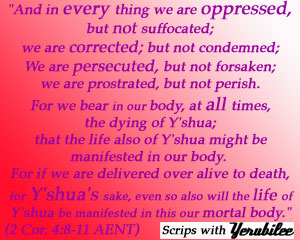And if one of the pagans invite you, and you are disposed to go, eat whatever is set before you, without an inquiry on account of conscience. 1 Cor. 10:27 AENT pg. 518
The AV puts it this way:
If any of them that believe not bid you to a feast, and ye be disposed to go; whatsoever is set before you, eat, asking no question for conscience sake. 1 Cor 10:27 KJV
Points:
1: One that “does not believe” equals “pagan.”
2: The feast that an “unbeliever/pagan” invites you to is at the very least, a potential pagan feast.
3: “And you are disposed to go…” The choice is YOURS. You are FREE to choose whether or not you wish to attend a pagan feast (such as Christmas). You are not Biblically constrained to shun unbelievers’ dinner tables at all costs.
4: “Eat whatever is set before you…” Just eat it, eat it, eat it, eat it! Thanks MJ & Weird Al for that one! Well, with one caveat, found in the very next verse:
But if any one will say to you, “This meat is derived from a sacrifice;” DON’T EAT IT… 1 Cor 10:28 AENT pg. 518
This relates to the larger discussion about “meat sacrificed to idols” which occupies most of 1 Corinthians 10. Actually, there is one other caveat, expressed elsewhere in the Full Counsel of the Bible, for example:
…for it is sanctified by the Word of Elohim and by prayer. 1 Timothy 4:5 AENT pg. 628
When meat is sanctified (Set Apart), it is FIRST made “Kadosh” by the WORD of ELOHIM (Leviticus 11) and SECONDLY by prayer.
To a first century reader/hearer of the Letter to the Corinthians, it GOES WITHOUT SAYING that the meat offered is from a CLEAN animal.
To those of us in the 20th/21st century, it takes a bit of searching to grasp the principle of eating clean meat from the NT, but it’s unmistakably in there!
“An idol is nothing.” (1 Cor 8:4) That’s the reason that meat from a CLEAN animal (Lev. 11) can be consumed, once it is cleansed through prayer from any idolatrous spiritual “goo.”
Further, see “Eighteen New Testament Misconceptions” beginning on pg.794 of the AENT.
In conclusion, even if you realize that Christmas or Easter, being pagan, has nothing to do with you, it’s Biblically ok to attend such a feast IF you know what you’re doing and IF you are inclined to go. Who knows? You might make some friends.




